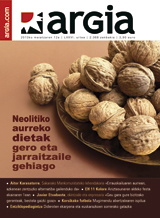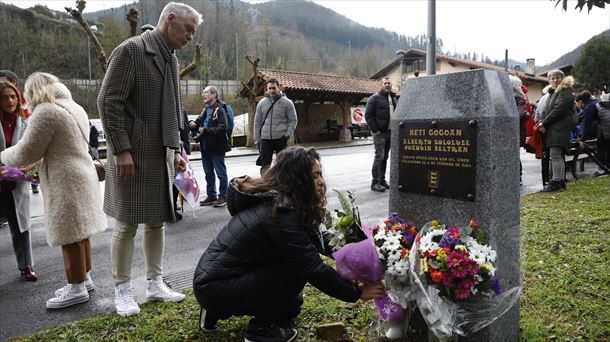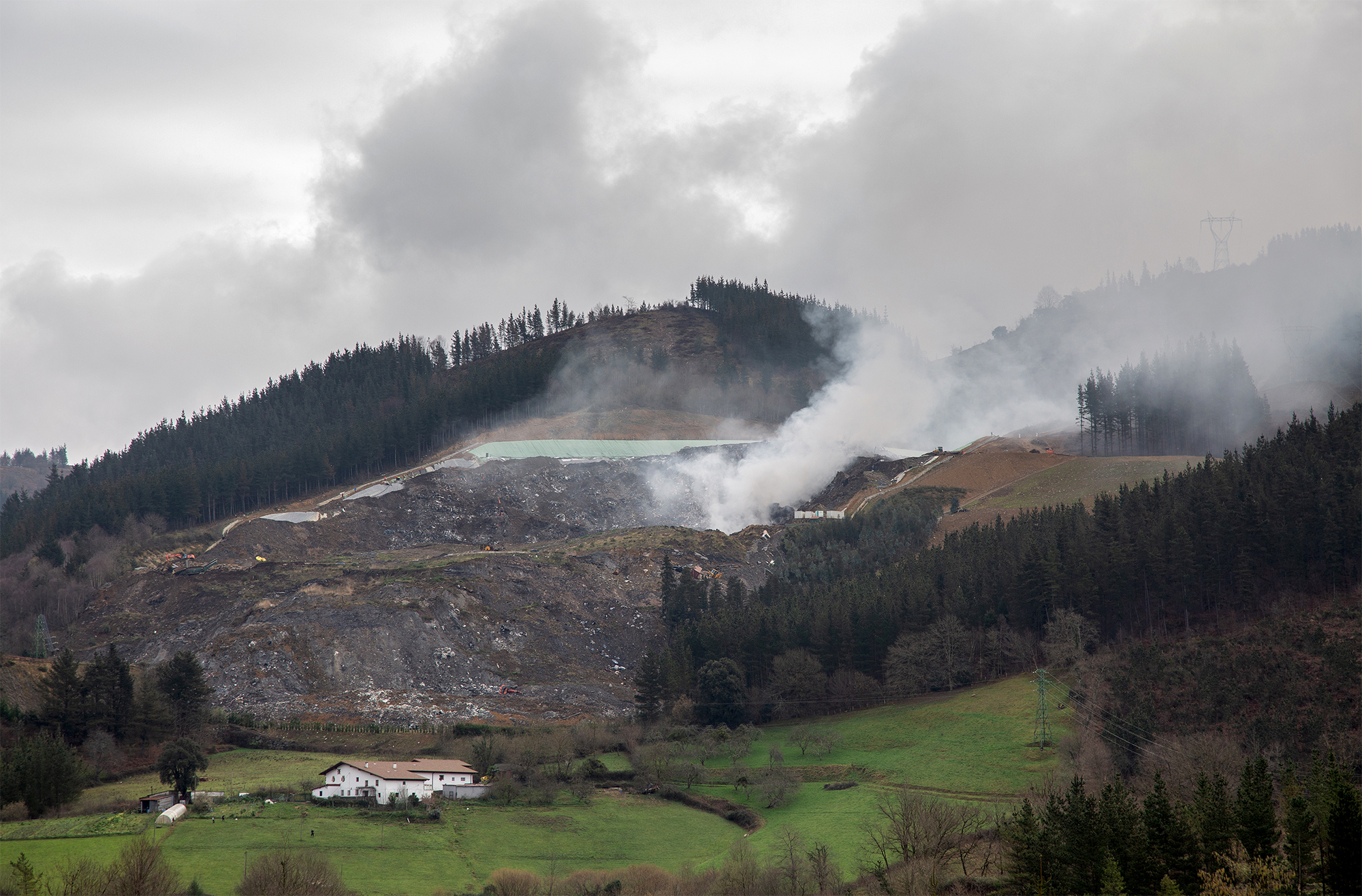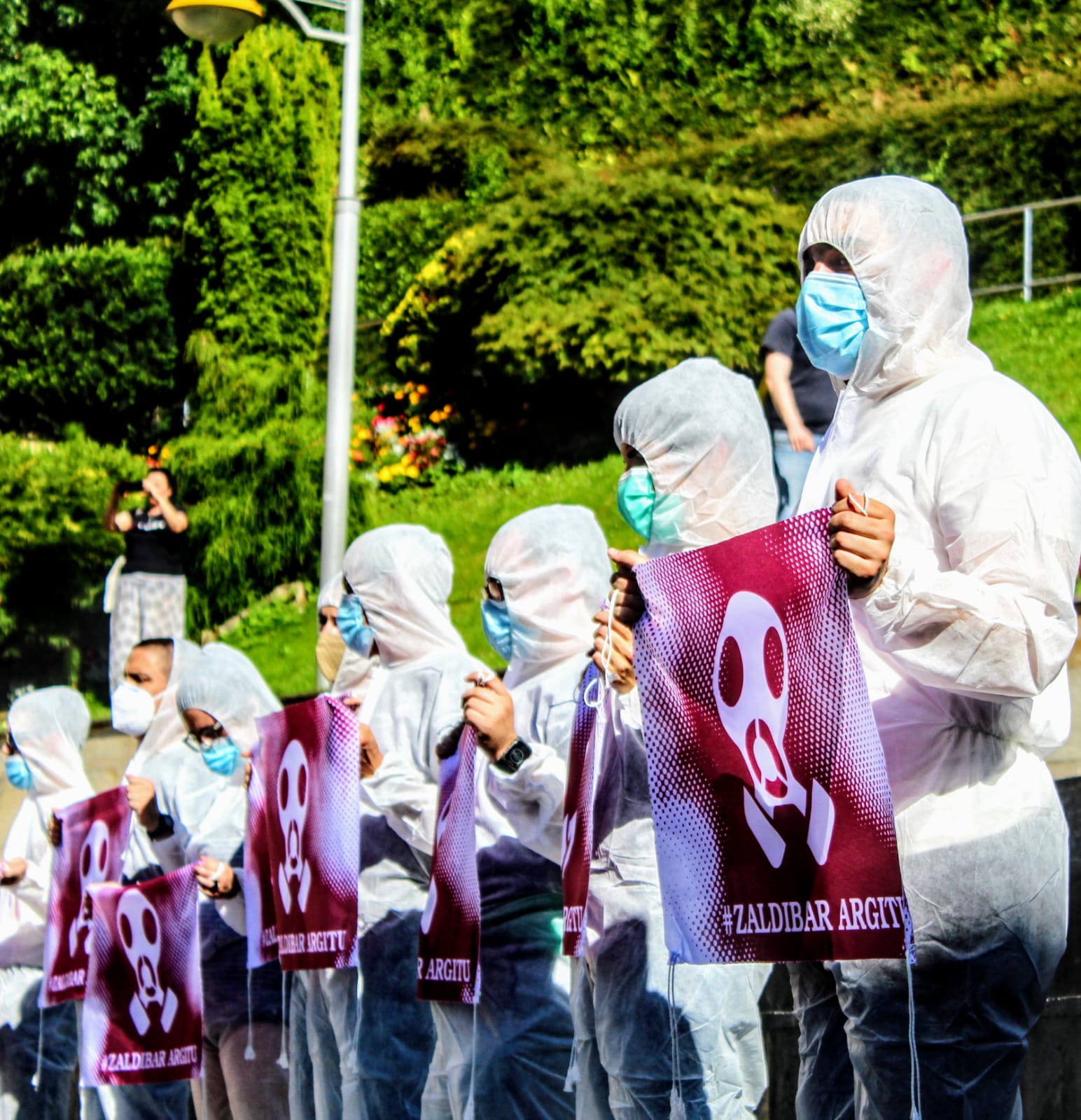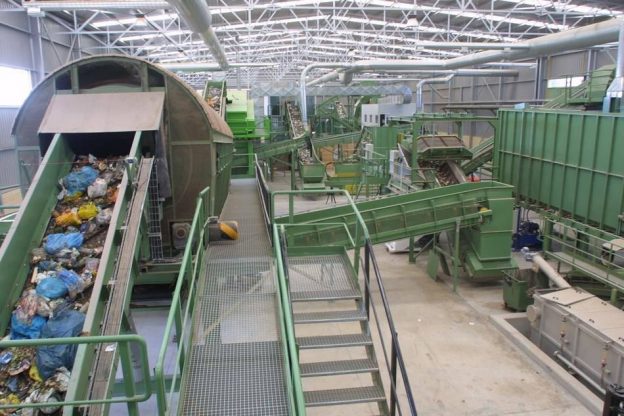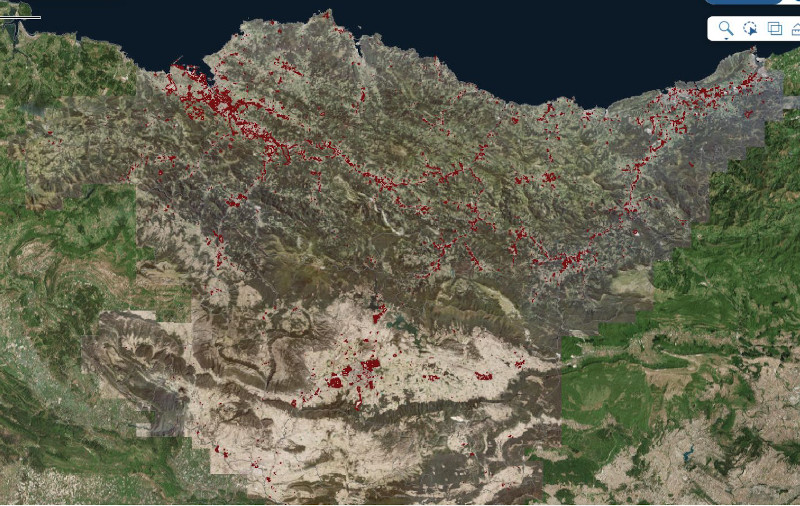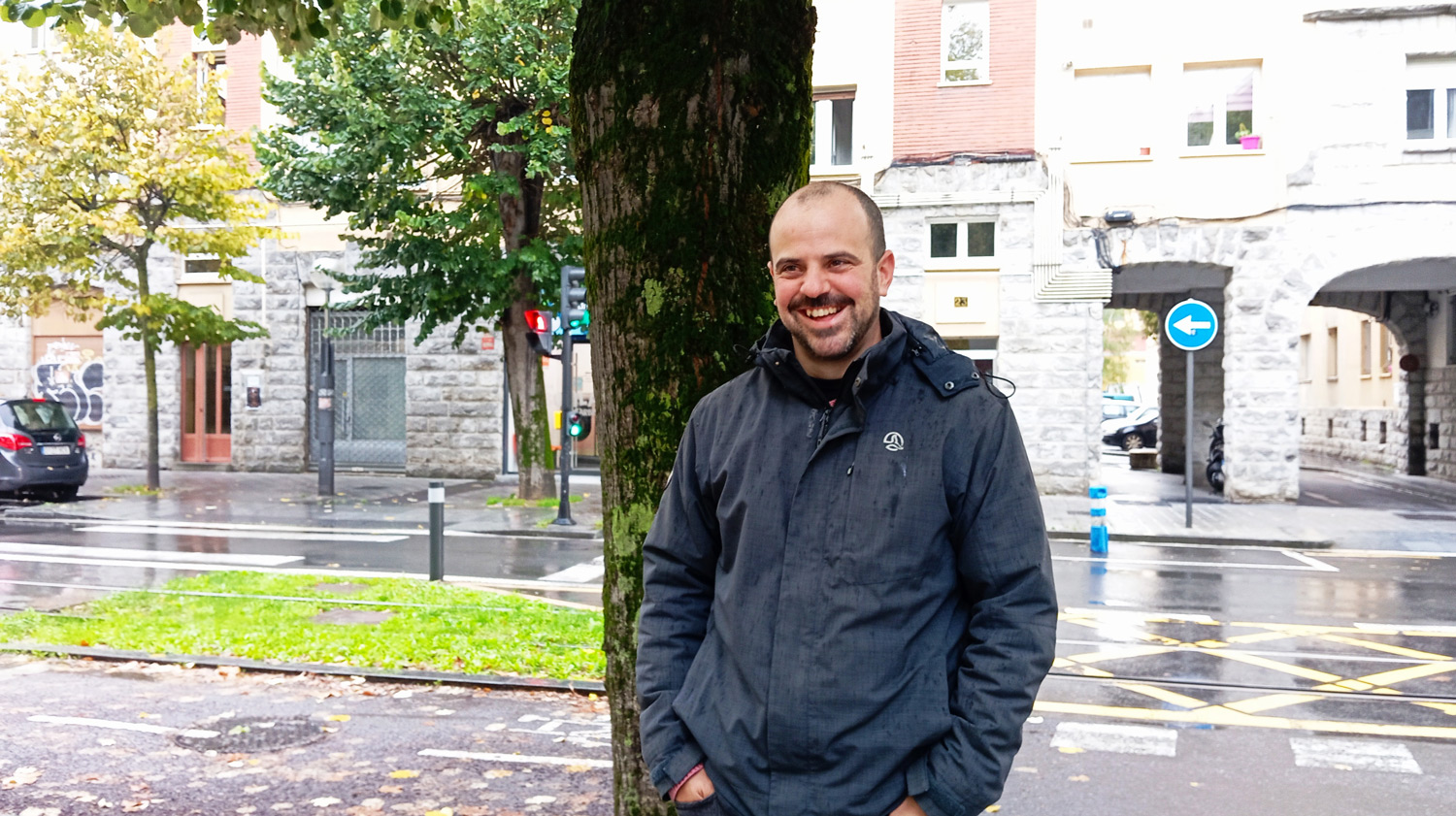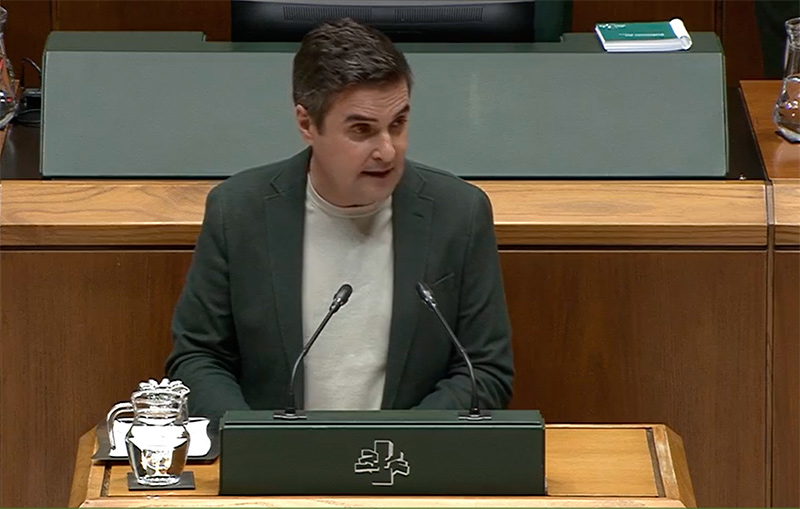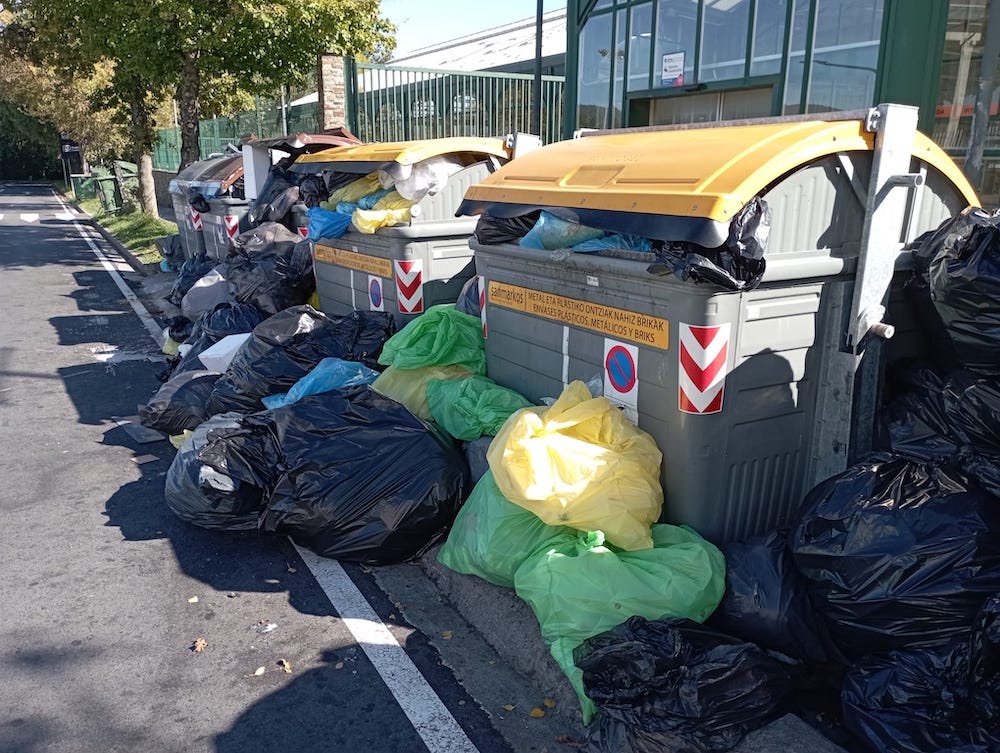"Door to door will give people confidence to do new things."
- For four months, Aitor Karasatorre (Etxarri Aranatz, 1972) toured Europe in a caravan and saw renewable energy projects. The result of this experience is the Camping Eco de Arbizu. He is currently a Bildu councillor in Etxarri Aranatz and President of the Sakana Commonwealth. It is clear that he has enthusiastically followed the issue of waste.
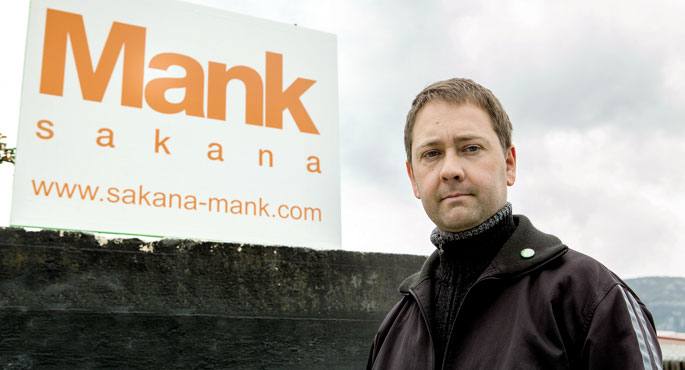
In a few weeks you will start collecting the waste door to door. From what thoughts did you start to decide on the implementation of this system?
The Navarra Integrated Waste Management Plan requires each community to determine how 50% of organic will be received. In order to comply with this law, a feasibility plan was elaborated, knowing that we only recycle 25% in the Sakana. According to some studies that have been carried out here, every year we deposit EUR 300,000 in the green container. We observe that the most appropriate system is door-to-door, not because 80% is already reached in recycling, but because it is the only one that ensures that the 50% established by the waste plan is complied with.
There have been no protests in Sakana about the dimensions they have promoted in Gipuzkoa, why do you think?
We started with the same problems. Competition is a matter for the community and our fear was that city councils would not get involved, but it has been tremendous. In Etxarri, with 2,700 inhabitants, ten meetings have been held and much work has been done on information.
Can you say that “counterinformation” has not been worked so hard?
In some municipalities there have been intentions to confuse them, but the last political group we have had against it has been the PP and its councilors did not know our offer, they did not know that in Catalonia they have been the drivers of it. They have acted very strongly and without arguments.
The idea of starting to incinerate in Portland Cements would also have something to do with…
It's curious. Portland immediately declared itself a door-to-door supporter. He said that it had nothing to do with waste incineration and that they were compatible. But now the only ones that have put bags in the windows of Olazagutia have been the workers of the company.
The first place at the regional level is door-to-door. You are fifteen municipalities, what has been the key to reaching an agreement?
We are fifteen independent republics. From the outset we knew that it was not going to be the only model for everyone, but the system is very adaptable and thanks to it we will make a collection adapted for each people. At first we thought we would run pilot tests, but that meant doubling the costs and eventually we decided to put them at the same time. It's been a very tough bet, from one side to the other it's 40 kilometers.
The largest locality in Alsasua, however, has remained outside the area.
Consultation was approved by a majority in Altsasu/Alsasua and the committee was set up for this purpose, although they have not yet met. Competition for waste collection may be restored. The Community has decided that it will not implement this system. Altsasu is waiting to see how the door-to-door goes in other villages, and that is very useful, because a lot of myths are going to fall. You'll see that you can do something tailored to Altsasu, which, despite having 8,000 people, this system works in larger localities.
How have political positions been influenced?
All political groups are represented in the Assembly of the Commonwealth and in September 2012 it was adopted without any vote against the door-to-door start-up. Shortly thereafter, NaBai offered a press conference against this initiative, which has only been suspended at Alsasua. At Etxarri it was an attempt, but we met with NaBai here to find out what the main problem was, we were called “organic”. We reached an agreement on this.
How?
We have not offered the only chance of picking up organic. The Pamplona community, for example, has imposed the fifth container on all of them. From the outset we have given every choice to the individual: self-composting, community composting and door-to-door. In short, Community composting is the fifth container. Anyone who sees problems with smell and comfort can throw away the organic at any time. On the other hand, it has more benefits than the fifth container: by not collecting or treating organic matter, this can mean a 40% saving in the garbage rate for citizens.
The number of petitions you have had to make compost is impressive. What percentage do you want to reach?
In the Sakana, there are already 1,200 people who have asked for the self-composting and we believe that the Community composting forecasts will be doubled. In some villages, we won't even pick up organic. In the region 4,000 tons of organic is generated, I am very optimistic and I think we can reach 50% self-composting. The other side would meet door to door. Now that we're in the Waste Consortium, we don't know where that organic rest, Carcarrera or outside, is going to take. Our intention is to install a Arbizun plant or composting and market it as “Sakana Compost”. The cycle would close here and jobs would be created.
You've proposed a new design for Auzokonposta
Yes, thanks to a report published in Argia, we learned that in Saint-Philibert in France there were some models for composting organic matter in large quantities. What we liked the most was the wooden caseta with key for the family 40-60 (see photo), occupies very little space: Only 4 square meters for 40 families. In Etxarri, for example, with 12 nuclei of these characteristics we can reach the entire population.
Sakana's door-to-door has the same function as other localities, but you have given special force to the material to be made of wood. How important is this beyond aesthetic criteria?
With door-to-door we have also wanted to promote the development of the economy. In Italy, 200 companies have been set up around this system, and seeing the situation in Sakana, with 2,000 unemployed… It seemed to us that we had to involve the companies here. Many companies have participated in the wood environment, it has been importante.Por
example, we predicted that the huts were wood, but not the poles to hang the cubes. Well, worked by a local company, these will also be wood, as well as emergency areas. Wood is a very present material here, reusable, that should not be brought from the outside. It is precisely this year that the Sakana Commonwealth has organised a workshop on forest employment for the second time; our biomass potential is very great.
Have you carried out studies on the possibilities that can be generated around waste?
We have recently set up the Development Agency, but only the municipalities have chosen to do so, the Government of Navarra has not given us any assistance. We only have one person working and the priority is to implement the strategic plan and the socio-economic observatory. We have not addressed the issue of waste. However, we have some examples nearby: In Falces, a winemaker named Pedro García reuses glass bottles instead of breaking them. All this is being investigated, and we do not know how many jobs can be created in Sakana; it has been said that in the area of recycling 500 000 jobs can be created in Europe.
UPV/EHU researcher Antonio Casado da Rocha believes that with door-to-door work is done from an ethical “micro” point of view: respect for the environment begins from our trash bin.
And on the other side there's comfort. Many times we prioritize comfort rather than a small effort.
Can that explain some people to talk about taxation?
We in the talks, when people started to worry, we taught them the cycle of the phases of change. Then they realized the phase it was in, in red or in orange. It has nothing to do with garbage, it's a matter of fear of change.
What other steps can be taken in this awareness?
Many things can be done: boosting green dots, recycling glass in another way, conducting pilot tests to return packaging like in Catalonia… Door-to-door will be of great help as a starting point, as it will give people confidence to stop fearing and doing new things. This is the right time. For example, in Etxarri, the subject of orchards is well advanced. Organic matter, compost, vegetable garden, other consumption models… All of this will make a joint journey and it will be good.
Nafarroako Gobernuarekin zein harreman duzue hondakinen gaiaren inguruan?
Roberto Jimenez Hondakinen Partzuergoko batzordeburu zenean beste era bateko kudeaketa defendatu zuen, baina gero bera izan zen Portland-en hondakinak erraustu ahal izatearen kontua mugitu zuena. Ondoren José Javier Esparza jarri zen kontseilari. Tarte horretan partzuergoko teknikariekin landu genuen gaia, diruz lagunduko zigutela adostu genuen, gurekin izan ziren Usurbilen…
Kontseilariak agerraldia egin zuenean, denok espero genuen normaltasun mezu hori helaraztea. Baina atez atekoaren kontrako argudioak zabaldu zituen, eta hor okertu ziren harremanak. Gerora, UPNren aldetik “tregua” moduko bat hitzeman ziguten eta orain badirudi berriz ere harremanak normaltasunera itzuli eta diruz laguntzea pentsatzen ari direla.
Hondakinen planean atez atekoa aurreikusten da, baina plan hori atzera bota du auzitegiak.
Planak ez du zehazten errauskailua non joango den, eta Sustrai Erakuntza elkartearekin helegitea jarri genion, bagenekielako azkenean Sakanara etorriko zela. Bitxia da, guk atez atekoa defendatzeko beti esan izan baitugu legeak babesten gintuela. Dena den, Nafarroako Gobernuak auzitegiaren erabakia errekurritu du eta planak indarrean segitzen du.
Nafarroako Gobernuak errausteko baimena eman dio Portland-i, badirudi hasieratik zuela asmoa errauskailua Sakanan ezartzeko…
Biomasa erretzeko baimena eskatu zutenean esan genuen trikimailu bat zela, hondakinak erretzeko aurre-pausoa. Guk Sakanan dagoen biomasa eskaini genien, 20.000 tona inguru, baina uko egin zioten. Udal guztiak kontra agertu zirenean, udal gaineko lege bat asmatu zuten.
Paradoxikoa da, gehien birziklatuko duen eskualdean erraustuko dituzte hondakinak. Arlo judizialetik eta alternatiba bat eskaintzetik harago, zer egin liteke?
AHTarekin gertatu den bezala, azkenean zentzuzko alternatibak egingo du aurrera. Tren horrek txikizio handia zekarren Sakanatik pasatzean, baina orain hirugarren erraila jartzearekin nahikoa dela uste dute. Oraingo Nafarroako Gobernuak edo etorriko denak, errauskailuarekin halako mugimenduren bat egitea lortu behar dugu.
The City Hall of Donostia-San Sebastián announced at last Thursday’s plenary session that it will increase the waste rate by 26.5% from January 2025, claiming that Waste Law 7/2022 obliges this. Eguzki, for its part, has denounced that the law only applies in terms of costs,... [+]
August is the holiday month for many people, including those who rule. And yet it is common to take advantage of the month of August to deal with some issues without much noise, albeit of great importance.
This is what is happening with the project to centralize sludge... [+]







